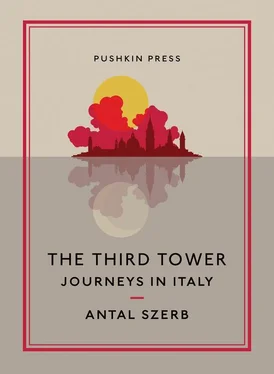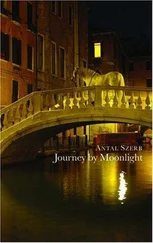Antal Szerb
The Third Tower: Journeys in Italy
TRANSLATOR’S INTRODUCTION
AUGUST 1936. The early-morning train is pulling into Venice, on time to the minute and crammed with happy, chattering people. Among them are the usual foreigners, mostly German, but today, as throughout this remarkable summer, they are overwhelmingly Italian, people of all ages and social classes, taking advantage of the cheap fares now available on the treni popolari. For this is Mussolini’s Italy, things are on the rise, and the whole country is caught up in the restless, happy excitement of a new era, bonded in common purpose at home, delirious with military success abroad. Abyssinia has been conquered; in Spain, Italian troops are triumphantly on the march; from Greece, Turkey and Africa, reporters pen ecstatic reminders of the extent of former Italian power. It is a country where, if you believe the papers, “only wonderful things” seem to happen.
The train has now come to a halt and stands steaming in the steadily rising heat. Among the disembarking throng, with their battered suitcases and endless excited chatter, is a diminutive, nervously smiling man in a large black hat. Sallow-skinned, he too could be Italian, possibly Jewish. He, too, should be moving along with the crowd, for he has yet to find somewhere to stay: his decision to come was made at the last minute, on a panic impulse, with no time to arrange anything. But to travel is one thing, to arrive another. He seems momentarily lost. Perhaps it is dawning on him, rather belatedly, that his reasons for coming had not been all they had seemed. For him Italy, Venice in particular, had never been a place of mere “travel”. It had meant too much to him, for far too long; had possessed him, at times, like a narcotic. It lay at the epicentre of a long-standing spiritual crisis, begun in adolescence, unduly protracted, perhaps not quite over yet.
It should be over. He is now thirty-five years of age, an assimilated Hungarian of Jewish descent, and has done much to establish himself both as a man and in the eyes of his fellow countrymen. His star (not yet a yellow one) is in the ascendant. His scholarly works (various monographs, a groundbreaking History of Hungarian Literature ) have won him serious academic recognition, to which his first novel, The Pendragon Legend (set in England and Wales), has added a wide popularity; his finest work is still to come. But there are limits. He still teaches, on a modest salary, not in the university where he rightly belongs, but in a commercial secondary school, for which he is by temperament totally unsuited, and where his pupils adore him. For, despite his formidable erudition and rising reputation, he is the gentlest, kindest, most self-effacing of men.
But time is not on his side, in any sense of the term: not this morning, if he is to find somewhere to rest his head; not for all the things he so desperately wants to see and re-experience on this visit. In truth, not ever. Whenever he comes to Venice, he now remembers, he sees it with the intensity of a dying man setting eyes on it for the last time. This time, he already half knows, it will be.
A thirty-five-year-old Hungarian arriving on the train to Venice… Readers of Journey by Moonlight will sense what is coming next. In Venice, despite the teeming crowds and the oppressive heat, he is filled with an intense elation that rises, in the dark little back alleys, to an unspeakable “ecstasy”. There he experiences once again the old, overwhelming “nostalgia”—too simple a word for the death-haunted, spiritual-erotic states of consciousness that had blighted his youth. Like Mihály, the hero of the novel (begun soon after his return home), he might reasonably have thought that having at last become a “serious person” he would now be safe from the “danger that Italy represented”. In the novel, with casual, indifferent ease, Venice lays that fantasy to rest. The hero’s painfully forged adult persona is stripped away, and his journey becomes an increasingly headlong descent into mental breakdown and spiritual despair.
The novel, undoubtedly, was written to exorcize those ghosts for ever, to purge its author once and for all of the follies, the “madness” of his youth. What raises it to the level of a masterpiece is not so much the subtlety of its language, or the elegant symmetry of its construction, but the unsparing intelligence, the relentless self-irony and the moments of wry humour that give it authority. None of that authority would have been possible without this difficult visit, made in 1936, at what should have been the midpoint of his life, amid war and rumours of war.
Mihály’s journey, though downwards and by “moonlight”, is ever towards self-knowledge, though ending in defeat. But his author, even as he savours the old heady poison of nostalgia, finds that it need no longer be his master. As his narrative proceeds, the tone, always engagingly personal with this writer, grows increasingly relaxed and playful. But he leaves us with a last, sideways glimpse of the power Venice once held over him. Of the ubiquitous mask he writes, in farewell to the city: “In Casanova’s day the mask was Venice. The hideous, beaklike visor held some essence, something demonic, some ancient principle of evil, that was so old and so refined that even today it stirs us no less powerfully than goodness and great acts of love.”
The route he follows, in successive packed and chattering treni popolari down to Ravenna, remains many-layered, recapitulating the steps both of his own earlier self (or selves) and of the mythical heroes of his youth.
During his first stop, Palladio’s Vicenza, the broad question of Italy and what it stands for in the “Northern mind” is brought into focus. His thoughts turn naturally to his admired Goethe, who first “discovered” the great neo-classical architect, and who inspired Szerb with his vision of the interconnectedness of all European culture — the theme of his great literary histories. But here we see another effect of layering: when he talks of Palladio’s art working, in combination with the mystical “serenity” of Italy itself, to “quell the Furies in Goethe’s soul, cleansing and purifying it”, does he allude to a process he feels beginning now in himself? If so, its precise workings, and quite where they might lead, remain unclear.
In Verona, despite its association with another of his mythical heroes, Szerb is forced to retreat. The pressure of modern Italy, and his increasingly uncertain place in it, suddenly become “too much”, and he flees to Lake Garda. The inner journey likewise takes a change of direction. Up in the hills he begins to muse on self and solitude — the preoccupation that will dominate the rest of the journey.
In this wandering and oblique passage towards ever-greater self-knowledge, his beloved Italy plays no small role. Chiefly, it forces a relentless series of disillusionments, sometimes gentle, more often brutal, upon him. There is something touchingly comic in the thought of our mild-mannered, hypersensitive, introverted little author, locked in his musings on history and the “Northern soul”, being cheerfully jostled on crowded trains, slapped on the back (for our Hungarian friends are currently all the fashion), and tormented by the happy revellers who fill his “historic” little room above the famously picturesque square in Verona (specially recommended by Baedeker) with guffawing, singing and shouting long into the night. But there is a darker side to all this jollity. Events offstage — in Spain, Abyssinia and elsewhere — are never far from his mind. His journey continues, taking in new sights, revisiting “monuments from his private past”, but the eyes that view them become increasingly dispassionate.
Читать дальше












